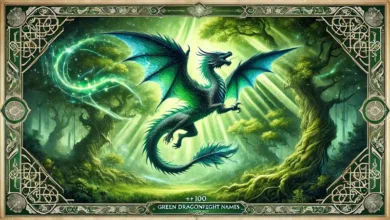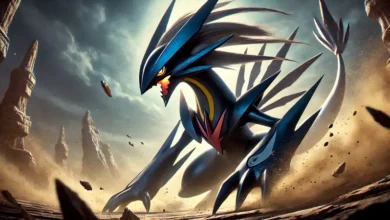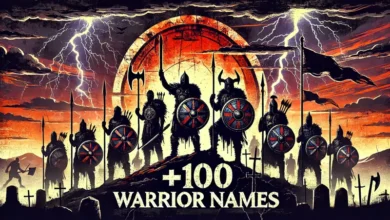Fictional Names
Ronin Names: +100 Legendary & Cool Warrior Names Explained
For copy name or description, please click on that!
| Name | Description |
|---|---|
Yume | Means "dream," symbolizing a ronin chasing her own destiny. |
Naito Masatoyo | A Takeda clan general who became a ronin after his lord’s death. |
Rika | Means "child of truth," reflecting a ronin dedicated to justice. |
Daichi | Means "great land," reflecting strength and stability. |
Yori | Means "trust," symbolizing a ronin who others can depend on. |
Ever dreamt of being a lone samurai, wandering the land without a master? A ronin? If so, you’ll need a name that captures the spirit of a solitary warrior.
In this guide, we’ll delve into the world of ronin names, exploring their history, significance, and even providing a ronin names generator to help you find the perfect moniker for your character.
Male Ronin Names
- Tatsuya – Means “dragon warrior,” symbolizing fierce power.
- Haruto – This name means “soar” or “fly,” representing a ronin with great ambition.
- Daichi – Means “great land,” reflecting strength and stability.
- Kenji – Means “intelligent second son,” symbolizing wisdom and skill.
- Takeshi – Means “warrior,” a perfect name for a fierce ronin.
- Akio – Means “bright” or “hero,” denoting a shining leader.
- Hiroshi – Represents “generous,” a ronin who gives all for his mission.
- Isamu – Means “courage,” the perfect name for a fearless ronin.
- Jiro – Means “second son,” a ronin who fights for his family legacy.
- Katsu – Means “victory,” symbolizing a warrior destined to win.
- Masashi – Represents “righteous warrior,” symbolizing honor and integrity.
- Nobu – Means “faith,” a ronin loyal to his code.
- Ren – Means “lotus,” symbolizing resilience in adversity.
- Satoshi – Means “wise,” a ronin with sharp intellect.
- Toru – Means “sea,” representing a ronin with calm, deep strength.
- Yamato – Means “great harmony,” reflecting a ronin in balance with nature.
- Kazuki – Means “hope of peace,” a ronin fighting for a better world.
- Shiro – Means “fourth son,” representing a steadfast warrior.
- Takashi – Means “noble” or “prosperous,” a ronin of high moral ground.
- Yoshiro – Means “righteous son,” embodying a just ronin.
- Kaito – Means “ocean flying,” symbolizing freedom and vast strength.
- Ryota – Means “clear and thick,” representing a powerful yet transparent warrior.
- Kojiro – Refers to a famous swordsman, denoting unmatched skill with the blade.
- Masao – Means “just” or “righteous,” highlighting a ronin’s devotion to honor.
- Hikaru – Means “light,” representing hope and guidance on the battlefield.
- Kenta – Means “healthy and strong,” symbolizing a warrior of great physical prowess.
- Ryo – Means “refreshing” or “cool,” denoting a calm and collected ronin.
- Sho – Means “fly,” representing agility and a sharp mind.
- Toshiro – Means “talented warrior,” a master of many skills.
- Yukio – Means “snow boy,” representing a ronin who is as silent and deadly as winter.
- Keisuke – Means “save” or “assist,” denoting a ronin who protects those in need.
- Makoto – Means “sincere,” representing a warrior with a pure heart.
- Naoki – Means “honest,” symbolizing integrity in battle.
- Osamu – Means “discipline,” a ronin dedicated to his path.
- Rikuto – Means “land,” denoting a warrior deeply connected to his homeland.
- Shinji – Means “true second son,” representing loyalty and honor.
- Tadashi – Means “loyal,” highlighting a ronin’s unwavering faith.
- Takuya – Means “pioneer,” symbolizing a ronin forging his own path.
- Yutaka – Means “abundant,” representing a ronin with vast resources and skills.
- Zan – Means “quiet strength,” a ronin who moves in silence but strikes with power.
- Jin – Means “benevolence,” a ronin who fights for the greater good.
- Kuro – Means “black,” symbolizing stealth and mastery in shadow.
- Rikimaru – A name denoting a ronin who is as strong as a mighty force.
- Shoma – Means “soaring horse,” representing a warrior with speed and grace.
- Takao – Means “noble man,” highlighting a ronin’s aristocratic heritage.
- Taro – Means “first son,” representing leadership and responsibility.
- Yori – Means “trust,” symbolizing a ronin who others can depend on.
- Kazuya – Means “peaceful one,” reflecting a ronin who fights for peace.
- Masato – Means “righteous man,” representing a ronin devoted to justice.
- Raiden – Means “thunder and lightning,” symbolizing a warrior with immense power.
Female Ronin Names
- Akiyama – Means “autumn mountain,” symbolizing strength and resilience in the changing seasons.
- Haruka – A name meaning “distant” or “faraway,” embodying a journeying warrior.
- Natsuki – This name stands for “summer hope,” reflecting optimism even in challenging battles.
- Yumiko – Meaning “archer child,” perfect for a skilled bow-wielding ronin.
- Chikako – Represents “child of wisdom,” denoting a strategist on the battlefield.
- Emiko – Meaning “smiling child,” a ronin who brings joy and hope to those around her.
- Fumiko – This name means “child of history,” honoring a warrior deeply rooted in tradition.
- Hanae – Means “blossom blessing,” signifying a ronin who nurtures life in a harsh world.
- Izumi – A name meaning “fountain,” representing an endless source of strength.
- Keiko – Means “blessed child,” highlighting a ronin blessed with skill and fortune.
- Mio – This name stands for “beautiful cherry blossom,” a symbol of fleeting life and graceful strength.
- Sakura – Meaning “cherry blossom,” symbolizing beauty in the face of adversity.
- Rika – Means “child of truth,” reflecting a ronin dedicated to justice.
- Tsukiko – Stands for “moon child,” a warrior guided by the light of the night.
- Michiko – Means “child of the way,” representing a ronin who follows a noble path.
- Nanami – This name means “seven seas,” evoking the power of a warrior whose influence spans vast distances.
- Sayuri – Meaning “small lily,” delicate yet deadly, like a sword in the hands of a master.
- Tomoe – A historical name referencing the legendary warrior Tomoe Gozen, known for her exceptional skill.
- Yasuko – Means “peace child,” a ronin striving to bring peace through her battles.
- Asami – A name meaning “morning beauty,” symbolizing new beginnings after war.
- Kiyomi – Means “pure beauty,” a ronin who fights with a clear heart.
- Hikari – Meaning “light,” representing a ronin who illuminates the dark paths.
- Miyako – Means “beautiful night child,” a ronin with grace and strength in the silence of night.
- Reika – Means “lovely flower,” embodying beauty in the midst of conflict.
- Tamiko – This name means “child of many,” a ronin who fights for the people.
- Ayaka – Meaning “colorful flower,” a symbol of hope in times of war.
- Kaede – Means “maple leaf,” reflecting the change and adaptability of a wandering warrior.
- Satsuki – Stands for “early moon,” a symbol of calm before the storm.
- Tsubaki – Meaning “camellia,” representing a warrior who is both beautiful and strong.
- Yume – Means “dream,” symbolizing a ronin chasing her own destiny.
- Aoi – Represents “hollyhock flower,” a ronin who is both strong and beautiful.
- Kohana – Means “small flower,” symbolizing humility and strength.
- Nadeshiko – Represents “fringed pink flower,” denoting grace in battle.
- Suzu – Means “bell,” a ronin known for her clarity and sound strategy.
- Yuka – Represents “gentle flower,” a symbol of quiet strength.
- Chieko – Means “child of wisdom,” denoting a tactician on the battlefield.
- Kazumi – Represents “harmony and beauty,” symbolizing a balanced warrior.
- Nozomi – Means “hope,” a ronin who never gives up on her mission.
- Shiori – Represents “poem,” a warrior whose story is written in battle.
- Tsubasa – Meaning “wings,” symbolizing a ronin with the freedom to go where fate takes her.
- Ume – Represents “plum blossom,” denoting resilience through harsh conditions.
- Yuriko – Meaning “lily child,” a symbol of purity and strength.
- Hatsuko – Represents “first-born child,” a leader among her peers.
- Mizuki – Means “beautiful moon,” symbolizing a ronin who is guided by intuition.
- Rin – Means “dignified,” a warrior who commands respect on the battlefield.
- Shizuka – Means “quiet,” representing a calm and focused ronin.
- Kohana – Represents “little flower,” denoting a humble but powerful presence.
- Mai – Means “dance,” symbolizing the graceful movements of a skilled warrior.
- Nami – Means “wave,” representing a ronin who adapts and flows with the challenges of life.
- Yui – Means “tie or bind,” symbolizing loyalty and the unbreakable bonds of a ronin.
Cool Ronin Names
- Bladewind – A ronin whose sword cuts through the wind itself.
- Shadowstrike – A warrior known for swift, unseen attacks.
- Ghostblade – A master of silent and deadly precision.
- Nightclaw – A fierce ronin, moving with the stealth of a panther.
- Stormsword – Wielding a blade as powerful as a raging storm.
- Ironfang – A warrior with unbreakable resolve and ferocity.
- Drakefire – A ronin with the heart of a dragon and the fury of flames.
- Silverwind – Swift and graceful, like the wind under the moon.
- Crimsonwolf – Known for striking fear with blood-red precision.
- Steelshadow – Unseen, but his presence is as sharp as steel.
- Thunderstrike – A powerful warrior, moving like a bolt of lightning.
- Blackveil – A ronin who hides his face, striking from the shadows.
- Wraithsword – A ghostly presence on the battlefield, leaving no trace.
- Ironhawk – A fierce, sharp-eyed ronin known for deadly accuracy.
- Venomblade – Striking quickly and lethally, like a poisoned dagger.
- Frostclaw – A ronin with cold precision, as deadly as winter’s bite.
- Phoenixflare – Rising from the ashes of defeat to strike again.
- Darkfang – A dangerous, lone wolf ronin, feared by enemies.
- Onyxblade – Wielding a sword as dark and powerful as obsidian.
- Skylance – A ronin with speed and accuracy, piercing through the heavens.
- Ghostwind – Moving with the breeze, striking silently and quickly.
- Firestrike – A blazing ronin, charging into battle with passion.
- Moonfang – A fierce warrior under the moon’s watchful gaze.
- Ironclaw – A relentless and powerful force, gripping victory tightly.
- Shadowraven – A dark and mysterious ronin, always watching from the skies.
- Dreadstorm – A force of nature, leaving chaos in his wake.
- Whiteshadow – Moving unseen even in the light, a ghost on the battlefield.
- Stormrider – Charging into battle like a force of nature.
- Ironblade – A master swordsman with a heart as strong as iron.
- Nightblade – Striking under cover of darkness, a silent predator.
- Razorwind – His sword slices through the air as fast as the wind.
- Skullstrike – A fierce and feared warrior, taking down enemies with precision.
- Bloodhawk – Known for his ruthlessness and swift aerial attacks.
- Wolfsbane – A lone wolf ronin, feared by those who cross him.
- Shadowflare – A ronin whose attacks burn as fiercely as they remain unseen.
- Ghostclaw – Silent and deadly, leaving no trace of his presence.
- Ironfang – A powerful and unyielding warrior, like the bite of iron.
- Frostblade – Cold and calculating, his sword strikes with icy precision.
- Skyshadow – A ronin who moves like the wind, unseen from the skies.
- Crimsonstrike – A warrior known for his brutal and bloody attacks.
- Thunderclaw – A ronin with the strength of thunder in each blow.
- Shadowfang – Lurking in the darkness, striking when least expected.
- Firehawk – A blazing warrior, descending from the skies with fury.
- Wraithclaw – A ghostly figure, always one step ahead of his enemies.
- Bladestorm – A whirlwind of attacks, leaving nothing but destruction.
- Nightstorm – A ronin who moves as silently as the night but as powerful as a storm.
- Steelstrike – A precise and unstoppable force, with the strength of steel.
- Darkclaw – Striking fear into the hearts of enemies with his silent and deadly claws.
- Skyslash – A ronin who cuts through the air like a falcon on the hunt.
- Venomclaw – A silent assassin, lethal and poisonous in every move.
Most Famous Ronin Names (Real and Legendary)
- Miyamoto Musashi – Perhaps the most famous ronin, an undefeated duelist, and the author of The Book of Five Rings.
- Sasaki Kojirō – A legendary swordsman who was defeated by Musashi in one of the most famous duels in Japanese history.
- Ōishi Kuranosuke – The leader of the 47 Ronin, who avenged their master’s death, known for his loyalty and strategy.
- Yagyū Jūbei Mitsuyoshi – A famous swordsman and ronin, known for his skill with the sword and service to the Tokugawa shogunate.
- Kuranosuke Oishi – Another name for the leader of the 47 Ronin, famous for orchestrating their legendary revenge.
- Teraoka Heiemon – One of the 47 Ronin who participated in the vendetta to avenge their master.
- Chikamatsu Monzaemon – A playwright and ronin known for his contributions to Japanese theater.
- Horibe Yasubee – A skilled swordsman and one of the most notable members of the 47 Ronin.
- Kato Kiyomasa – A feared general during the Sengoku period who became a ronin after his lord’s fall.
- Oboshi Yuranosuke – A fictionalized leader of the 47 Ronin in various plays and movies, based on Ōishi Kuranosuke.
- Tsukahara Bokuden – A legendary swordsman and ronin, famous for his development of kenjutsu.
- Nakayama Yasubei – A ronin who gained fame as part of the 47 Ronin for his skill in combat.
- Saitō Hajime – A former Shinsengumi captain who lived as a ronin after the fall of the shogunate.
- Togashi Mitsutoshi – A historical figure known for becoming a ronin after the destruction of his family’s house.
- Kawakami Gensai – One of the Four Hitokiri of the Bakumatsu era, a feared and famous ronin assassin.
- Matsudaira Nobutsuna – A respected strategist and warrior who once roamed as a ronin before finding service again.
- Araki Mataemon – A skilled swordsman and ronin who became famous for avenging his brother.
- Yamamoto Kansuke – A ronin and strategist known for his role in the Takeda clan’s military campaigns.
- Itō Ittōsai – A legendary swordsman who became a wandering ronin and founded the Ittō-ryū school of swordsmanship.
- Yamada Asaemon – Known as the “Executioner” of Edo, a famed ronin and swordsman.
- Ooka Tadasuke – A magistrate who was once a ronin, later becoming known for his wisdom and fairness in law.
- Sanada Yukimura – A legendary warrior known for his exploits during the Siege of Osaka, living as a ronin after his lord’s death.
- Hattori Hanzō – A famous ninja and ronin, known for his deadly skill and loyalty.
- Kusunoki Masashige – A renowned samurai and later ronin who became famous for his loyalty to the emperor.
- Mochizuki Chiyome – A legendary female ronin who trained women as ninjas (kunoichi) during the Sengoku period.
- Yagyū Munetoshi – The founder of the Yagyū Shinkage-ryū school, who once lived as a ronin.
- Amakusa Shirō – A famous young ronin who led a rebellion during the Shimabara Rebellion.
- Toyotomi Hideyoshi – Though he became one of Japan’s great rulers, he started his career as a low-ranking ronin.
- Maeda Toshimasu – A ronin known as “Keiji,” famous for his wild behavior and fierce fighting skills.
- Takeda Shingen – One of the great warlords of Japan, who spent part of his early life as a ronin.
- Kuroda Kanbei – A brilliant strategist who became a ronin after being imprisoned by his own lord.
- Hirate Masahide – A mentor to Oda Nobunaga who became a ronin after his lord’s death.
- Abe Masahiro – A prominent diplomat who served as a ronin for a time before his rise in the government.
- Sakai Tadatsugu – A skilled warrior and ronin who later served Tokugawa Ieyasu.
- Tadakatsu Honda – A loyal samurai of the Tokugawa clan who briefly lived as a ronin.
- Hojo Ujimasa – A warlord who became a ronin after the fall of the Hojo clan.
- Date Masamune – The one-eyed dragon, who briefly wandered as a ronin before rising to power.
- Gotō Matabei – A warrior known for his exploits during the Siege of Osaka, spending time as a ronin.
- Akashi Takenori – A loyalist to the Toyotomi clan who lived as a ronin after their downfall.
- Kira Yoshinaka – The antagonist in the 47 Ronin story, whose death at their hands immortalized their legend.
- Fujita Goro (Saitō Hajime) – The former captain of the Shinsengumi, who lived as a ronin after the fall of the Tokugawa shogunate.
- Kikuchi Taketoki – A ronin who played a key role in the southern court during the Nanboku-chō period.
- Taira no Tadamori – A famous samurai who wandered as a ronin before establishing himself.
- Akechi Mitsuhide – A samurai-turned-ronin who betrayed Oda Nobunaga.
- Shima Sakon – A ronin who became one of the greatest generals of the Toyotomi clan.
- Otani Yoshitsugu – A skilled general who became a ronin after his lord’s defeat.
- Shinsaku Takasugi – A revolutionary ronin who played a major role in the fall of the Tokugawa shogunate.
- Naito Masatoyo – A Takeda clan general who became a ronin after his lord’s death.
- Watanabe no Tsuna – A legendary swordsman and loyal retainer of Minamoto no Raikō, often depicted as a ronin in folklore.
- Benkei – A famous warrior monk who became a ronin after the fall of his master, Minamoto no Yoshitsune.
Here are the names of the 47 Ronin
- Ōishi Kuranosuke Yoshio – Leader of the 47 Ronin, chief retainer of Asano.
- Hara Sōemon Mototoki – A samurai who supported the plan for vengeance.
- Fuwa Kazuemon Masatane – Known for his loyalty and combat skill.
- Mimura Jirōzaemon Kanetsune – Played a key role in the plot.
- Okuda Magodayū Shigemori – Notable for his dedication to the mission.
- Onodera Jūnai Hidekazu – Loyal retainer and participant in the raid.
- Kataoka Gengobē Takafusa – A respected warrior among the 47 Ronin.
- Matsuzaki Kūrō Yoshisada – Supported the vengeance plan wholeheartedly.
- Horibe Yasubee Taketsune – One of the most famous members, skilled in swordsmanship.
- Chikamatsu Kanroku Yukishige – Renowned for his tactical support.
- Kimura Okaemon Sadayuki – Contributed to the planning of the attack.
- Kuranosuke’s son, Ōishi Chikara Yoshikane – Followed in his father’s footsteps.
- Hayami Tōzaemon Mitsutaka – Participated in the raid against Kira.
- Sakai Heihachirō Masatoki – Another dedicated samurai of the 47 Ronin.
- Tominomori Sukeemon Masayori – Known for his bravery in the final assault.
- Kanzaki Yogorō Masatomo – Actively involved in avenging Asano.
- Kayano Wasuke Tsuneyuki – Fought valiantly during the raid.
- Terasaka Kichiemon Tsuyuzumi – Survived and was the only ronin not to commit seppuku.
- Isogai Jūrōzaemon Masahisa – Dedicated samurai who saw the mission through.
- Katsuta Shinsuke Taketaka – Another key member of the 47.
- Ōtaka Gengo Tadayoshi – Known for his fearless resolve.
- Yada Gorōemon Suketake – A loyal follower of the plan.
- Yoshida Chūzaemon Kanesada – Honored for his contribution to the vengeance.
- Horio Matanojō Motonobu – Another brave warrior from the 47 Ronin.
- Yokogawa Kanpei Hisayoshi – Played a significant role in the plot.
- Muramatsu Kihei Hidenao – Key participant in the mission.
- Okano Kin’emon Kanehide – Known for his determination in the raid.
- Kawai Matagorō Yoshinobu – Fought fiercely in the battle.
- Muramatsu Sandayū Takanao – Helped in planning the attack.
- Kataoka Dengoemon Takafusa – A core member of the group.
- Hazama Jūjirō Mitsunobu – Participated actively in the raid.
- Sugino Juheiji Tsugifusa – Well-regarded for his loyalty.
- Tachibana Heihachirō Munetoshi – Helped execute the final plan.
- Yokogawa Munetoshi – Dedicated to the mission till the end.
- Tōda Shichizaemon Mitsunobu – An essential fighter in the raid.
- Tomioka Magodayū Naonori – Fought with bravery and honor.
- Kawashima Jimbei Hidekazu – Known for his unwavering loyalty.
- Nakashima Magodayū Masatatsu – A courageous member of the 47 Ronin.
- Kondō Kyuemon Yukitsugu – Helped ensure the raid’s success.
- Takebayashi Tadashichi Takashige – Fought honorably in the battle.
- Mase Magokurō Masatoki – Known for his valor.
- Hara Gōemon Mototoki – Loyal samurai who carried out the revenge.
- Hayashi Hanzō Taketoshi – Key figure in the plot.
- Ishizuka Tarōzaemon Masaharu – Played a crucial role in the attack.
- Nakamura Kansuke Masatoki – Contributed to the success of the raid.
- Kurahashi Densuke Takeyuki – Known for his bravery.
- Kayano Shigenari Tsuneyuki – Fought till the end to avenge his lord.
- Samurai: These were noble warriors who served under a daimyo (a feudal lord) or the shogunate. Samurai had duties, including protection and military service for their lords, and they were held in high regard within the social hierarchy, enjoying privileges and status.
- Ronin: A ronin was a samurai who became masterless, often due to their lord’s death or loss of favor. In the social order, ronin were considered lower than samurai because they no longer had a lord to serve, and their status was seen as diminished. Ronin were often depicted as wandering or seeking new opportunities, and they could sometimes be seen as dishonored or disgraced.
So, while samurai were an integral part of the feudal system, loyal to their lords, ronin were essentially samurai who had lost that connection, making them lower in statu









